19-09-2016
Probiotics - their many preventive and curative effects
 The results of clinical research published over the last fifteen years highlight the many beneficial effects of probiotics. They appear to have both preventive and curative effects, particularly in viral and antibiotic-associated diarrhoea, atopic eczema, lactose intolerance and inflammatory diseases of the digestive tract. Other studies indicate they may also play an important role in resistance to respiratory infections and cancer prevention.
The results of clinical research published over the last fifteen years highlight the many beneficial effects of probiotics. They appear to have both preventive and curative effects, particularly in viral and antibiotic-associated diarrhoea, atopic eczema, lactose intolerance and inflammatory diseases of the digestive tract. Other studies indicate they may also play an important role in resistance to respiratory infections and cancer prevention.The concept of probiotics was developed as a result of the work of Metchnikoff (1907) who had noted that Bulgarian peasants, whose diet was rich in fermented milk, enjoyed very long and healthy lives. Metchnikoff recommended ingesting live bacteria, specifically lactic bacteria, in order to reduce intestinal disorders and improve digestion, and so extend life expectancy.
The term ‘probiotic’ comes from the Greek words ‘pro’ and ‘bios’, which literally mean “for life”, in contrast to the term ‘antibiotic’ meaning “against life”. The term was first introduced in 1965 to describe substances produced by a micro-organism that stimulate the growth of other micro-organisms. Since then, many definitions have been advanced but according to the United Nations and World Health Organisation, probiotics are live microorganisms that, when administered in adequate amounts, confer a health benefit on the host.
Gut microflora, protection against invasion
Gut microflora or microbiota consist of a wide variety of microbial species fulfilling different functions. Representing 400-500 species and sub-species, the number of microbiota is estimated at close to 1013-1014 billions of cells - around 10 times the total number of cells in the human body. Microflora form a veritable protective barrier against foreign bodies, and also help stimulate the immune response which, while activated in the intestine, appears to have an effect throughout the body, particularly in the respiratory tract.
The composition and function of gastrointestinal flora are influenced by various factors linked to changes in the host’s physiology (age, state of health), diet and environmental conditions (contamination by pathogens, antibiotic treatment, chemotherapy, climate, stress, hygiene).
An imbalance in gut flora can lead to feeling below-par and tired and can manifest in gut disorders (diarrhoea, irritable bowel syndrome) as well as in greater vulnerability to infection. Over the longer term, it can promote more serious problems such as intestinal inflammatory diseases and colon cancer.
Probiotics act directly on the host’s gut flora by locally stimulating the growth and renewal of its constitutive micro-organisms, thus boosting the body’s protection.
Gastrointestinal infections
One of the most widely-recognised uses of probiotics is in preventing and treating diarrhoea. A number of studies have shown probiotic treatment leads to improvements in acute diarrhoeal problems, including rotavirus infections, traveller’s diarrhoea and more serious bacterial infections such as Clostridium difficile.
In children, the apparent effects of probiotics on viral diarrhoea are probably due to the stimulation of anti-rotavirus serum IgA antibodies1, 2, 3which reduce the duration and recurrence of episodes. Scientists reviewed 13 double-blind, placebo-controlled trials on infant and child acute infectious diarrhoea. Ten looked at treatment and three at prevention. Taken as a whole, the data would seem to suggest that probiotics may significantly reduce the duration of diarrhoea and even prevent it4.
Antibiotic-associated diarrhoea
The main indication for probiotics is in diarrhoea associated with antibiotic treatment. They restrict the adverse effects of antibiotics on endogenous gut flora and generally lead to improved tolerance. A meta-analysis shows that taking probiotics produces a significant decrease in incidence of diarrhoea during antibiotic treatment.
Diarrhoea associated with antibiotics, and that caused by Clostridium difficile are complications of antibacterial treatment that occur in 5%-25% of patients. C. difficile is responsible for around 15-25% of cases of antibiotic-associated diarrhoea, and mostly develops in elderly people two to three weeks after finishing a course of antibiotics. One study investigated 135 patients on antibiotics, with an average age of 74. They were given either 100g of a control milk product, or 100g of a milk product containing lactobacillus, twice a day for the duration of the antibiotic treatment and for one week after it. Probiotic supplementation was found to reduce incidence both of antibiotic-associated diarrhoea, and diarrhoea-associated C. difficile. Only 12% of subjects taking probiotics developed antibiotic-associated diarrhoea compared with 34% in the control group 5.
Helicobacter pylori intestinal infections
Colonisation of the gastric mucosa by Helicobacter pylori is common and is often associated with gastritis, ulcers, cancer or lymphoma. It has been demonstrated in vitro that various strains of probiotics, particularly lactobacillus, develop activity against Helicobacter pylori’s viability and its adherence to intestinal mucosa cells. The effects of probiotics on this bacteria were demonstrated in a review of 13 clinical studies - six involving patients taking probiotics only and seven involving those taking probiotics and antibiotic treatment.6.
The intestinal immune system and probiotics
There are more immune cells in the mucosa of the small intestine and colon than in the rest of the body put together. The intestinal immune system has to ‘tolerate’ proteins foreign to the body such as dietary proteins and those of intestinal bacteria, and at the same time, develop immune defences against enteropathogenic germs. The presence of intestinal bacteria has a strong influence on its development and function and can have consequences for the host’s immunity.
Two very important functions of the intestinal immune system are the production of antibodies belonging to a particular group of immunoglobulins - IgA - and oral tolerance. Through the production and secretion of IgA, the intestinal immune system protects the host from enteropathogenic micro-organisms, preventing adhesion, translocation to the systemic compartment and viral multiplication, and neutralising enterotoxins or blocking the passage of macromolecules. Oral tolerance consists of developing ‘suppressive’ type responses that prevent the specific immune responses of dietary proteins and resident bacteria from being induced at intestinal and systemic levels. This function thus prevents the development of food hypersensitivities such as allergies and inflammatory reactions of the digestive tract to intestinal bacteria, such as in Crohn’s disease. There is also important movement between the intestinal immune system, the systemic compartment and other mucosa, such as the vaginal mucosa.
Boosting the immune system
Older people are more vulnerable to infection due to the decline in their immune systems, particularly in lymphoid cell activity. Studies have shown that probiotic supplementation combats some of the effects of a weakened immune system, and in particular boosts natural killer cell activity7. In a study of 53 middle-aged subjects, administration of milk for three weeks produced no stimulation of their immune systems. They were then given milk enriched with Lactobacillus rhamnosus for a further three weeks and natural killer cell activity was found to have increased by 147%, suggesting that the Lactobacillus stimulated their systemic immune system8.
It has been shown that ingesting probiotics at the time of a vaccination may increase vaccine immune response9. In a placebo-controlled clinical study, young adults were given oral doses of Lactobacillus rhamnosus and L. paracasei strains before and after oral vaccination with attenuated poliovirus. The probiotics induced an immunological response (IgA, IgG) as well as increased production of virus-neutralising antibodies. Other studies indicate stimulation of both the phagocytic activity of blood monocytes and intestinal IgA10.
Allergies - eczema
Disruption of the mucosal barrier appears to be involved in the development of atopic dermatitis or eczema. Research suggests that probiotic supplementation may improve intestinal barrier function in children with the disorder.
A randomised, double-blind, placebo-controlled study investigated 188 families with allergic diseases. Mothers were given a daily supplement of Lactobacillus reuteri or placebo from the 36th week of pregnancy until labour. The babies were then given the same probiotic for their first 12 months of their lives and were monitored for 24 months. The incidence of eczema was the same in both groups (around 35%) but during the second year, the supplemented infants had less eczema-associated IgE (8% vs 20%). IgE is the main antibody associated with allergy. The children’s reactivity to common skin prick tests for allergy was also lower in the supplemented group, significantly so in the case of children whose mothers suffered from an allergy (14% vs 31%)11.
In another double-blind, placebo-controlled, cross-over study, children with atopic dermatitis aged between 1 and 13 years were given two strains of lactobacilli for six weeks. The researchers concluded that probiotics may reduce production of inflammation-generating cells and accessibility to allergens, normalise gut microflora and improve barrier function, regulate secretion of mediators of inflammation and promote appropriate development of the immune system in certain subjects12.
Respiratory infections
Probiotics with immune-stimulant properties may help prevent and treat some common viral infections. In a 7-month double-blind, placebo-controlled study, children aged between 1 and 6 years of age attending day care centres in Finland were given either milk to which a strain of L. rhamnosus had been added, or control milk. The probiotic reduced the length of absence due to digestive tract disease or respiratory tract infections by 0.7 days compared with controls. The children also had a lower risk of respiratory tract infection.
HIV - compromised immunity
Further evidence of probiotics’ beneficial effects on the immune system was revealed by a study examining supplementation with Lactobacillus plantarum in children genetically exposed to HIV 13. Children with HIV infection have episodes of diarrhoea and frequent malabsorption problems associated with possible bacterial overgrowth. 17 HIV-infected children were randomly given either Lactobacillus plantarum or a placebo. In the treated group, colonisation by Lactobacillus plantarum was evident within two weeks but stopped after supplementation ceased. No side-effects were observed. Improvements in the children’s size and weight were noted during follow-up visits. The study’s authors also reported a marked increase in immune response
. In a study of 77 HIV-infected children aged 2-12, one group were given probiotics for two months, and another a placebo. CD4 counts were collected at the beginning and end of the supplementation period. The number and quality of their stools was evaluated by a questionnaire. Results showed an increase in CD4 count in the probiotics group and a decrease in the control group. The quality of stools also improved in those given probiotics. This study shows that probiotics have immune-modulatory properties and that they may be useful in the treatment of HIV-infected children 14.
Chemotherapy and radiotherapy often cause severe disruption to the immune system and intestinal microflora with diarrhoea and/or an increase in fungal cells (Candida albicans) in the digestive system and other organs. Research in animals and humans has shown that probiotics increase immunity and resistance to infection. In an immune-deficient mouse model, Lactobacillus sp. and bifidobacteria reduced the systemic spread of Candida albicans15.
In addition, a placebo-controlled trial of children with cystic fibrosis showed a reduction in severity of pneumonia as a result of administration of Lactobacillus GG. This protection from respiratory diseases may be linked to up-regulation of mucin cells along with stimulation of antibody response. Expanding the use of probiotics to those with compromised immunity appears promising.
Lactose intolerance
Taking probiotics improves lactose absorption in lactase-deficient patients and reduces digestive symptoms caused by lactose intolerance. This effect is mainly due to the fact that live bacteria contain microbial lactase which is released in the small intestine to support lactose hydrolysis, a stage of digestion partly deficient in those with lactose intolerance.
Intestinal inflammatory disease
According to the literature, the inflammatory processes involved in diseases of the intestine, such as Crohn’s disease, ulcerative colitis and pouchitis, may be controlled by probiotics. Administration of probiotics resulted in longer periods of remission associated with lower expression of inflammatory markers ex-vivo and an increase in IgA secretion, reduced medication and a better quality of life overall.
The anti-inflammatory effects of three probiotics with immune-modulatory properties (Lactobacillus casei, Lactobacillus acidophilus et Bifidobacterium lactis) were evaluated in a colitis model in rats. The three probiotics restored levels of glutathione in the colon depleted as a result of the oxidative stress of the inflammatory process, each substance showing a different anti-inflammatory profile. All three may be considered as potential adjuncts in the treatment of inflammatory bowel disease 16.
Irritable bowel syndrome
Irritable bowel syndrome causes painful cramps, diarrhoea alternating with constipation and other symptoms. The syndrome’s precise causes are not yet known but may involve compromised health of gut bacteria. Based on this theory, probiotics have been used with some success in treating the condition.
Most of the symptoms of irritable bowel syndrome appear following an infection. Many human and animal studies have demonstrated the presence of increased infiltration by inflammatory cells and hyperplasia of enterochromaffin cells in the intestinal mucosa after an acute attack of gastroenteritis. In humans, irritable bowel syndrome may be prevented by the use of probiotics to reduce the duration of the gastroenteritis17.
Anti-cancer effects
A number of studies have highlighted an inverse correlation between consumption of fermented dairy products, particularly yogurt, and risk of colorectal tumours, cancer or adenomas. Several studies on rats and mice and a few human studies suggest that lactic bacteria may have a beneficial effect at several levels on reducing the risk of colon cancer. In humans and animal models, ingesting lactic bacteria has been shown to reduce the concentration of enzymes responsible for releasing mutagenic agents in the colon. In a study that looked at the effects of supplementation with L. acidophilus in 21 healthy volunteers18
Potential cholesterol-lowering effect
Preliminary studies have revealed that consumption of yogurt or fermented milk containing probiotics lowers cholesterol levels in the blood. In vitro, certain Lactobacillus strains are able to absorb cholesterol. In laboratory studies, serum cholesterol levels in rats fed with Lactobacillus-rich milk mixed with their food were lower than those of control animals. The Lactobacillus strains seemed to directly eliminate the cholesterol19.
-----------------------------------------------------------------------------------------
References :
1. Pedone C.A. et al., The effect of supplementation with milk fermented by lactobacillus casei on acute diarrhea in children attending day care centres, IJCP, 1999, 53, 179-184.
2. Salminen S. et al., Clinical applications of probiotic bacteria, Int. Dairy J., 1998, 8, 563-572.
3. Salminen S. et al., Functional Food science and gastrointestinal physiology and function, Br. J. Nutr., 1998, 80, 563-572.
4. Szajewska H. et al., Probiotics in the treatment and prevention of acute infectious diarrhea in infants and children: a systematic review of published randomized double-blind placebo-controlled trials, J. Pediatr. Gastroenterol. Nutr., 2001, 33 (suppl4):S17-S25.
5. Hickson M. et al., Use of probiotic Lactobacillus preparation to prevent diarrhoea associated with antibiotics: randomised double blind placebo controlled trial, BMJ, doi:10.1136/bmj.39231.599815.55 (published June 2007).
6. Hamilton-Miller J.M., The role of probiotics in the treatment of Helicobacter pylori infection, Int. J. Antimicrob. Agents, 2003 Oct, 22(4): 360-6.
7. Gill H.S. et al., Dietary probiotics enhance natural killer cell activity in elderly: an investigation of age-related immunologic changes, J. Clin. Immunol., 2001, 21: 264-271.
8. Ying-H. Sheih et al., Systemic immunity-enhancing effects in healthy subject following dietary consumption of the lactic acid bacterium Lactobacillus rhamnosus HN001, Journal of the American College of Nutrition, 2001, vol. 20(2): 149-156.
9. Link Amster H. et al., Modulation of a specific humoral response and changes intestinal flora mediated through fermented milk intake, FEMS Immunol. Med. Microbiol., 1994, 10, 55-63.
10. Yoon H. et al., New insights in the validation of systemic biomarkers for the evaluation of the immunoregulatory properties of milk fermented with yogurt culture and Lactobacillus casei (Actimel): a prospective trial, Int. J. Immunotherapy, 1999, XV, 79-89.
11. Abrahamsson T.R. et al., Probiotics in prevention of IgE-associated eczema: a double blind, randomized, placebo-controlled trial, Journal of Allergy and Clinical Immunology, 2007, vol. 119(5); 1174-1180.
12. Isolauri E., Dietary modification of atopic disease: use of probiotics in the prevention of atopic dermatitis, Curr. Allergy Asthma Rep., 2004 Jul, 4(4): 270-5.
13. Cunningham-Rundles S. et al., Probiotics and immune response, Am. J. Gastroenterol., 2000, 95: S22-S25.
14. Trois L. et al., Use of probiotics in HIV-infected children: a randomized double-blind controlled study, J. Trop. Pediatr., 2007, Sept 17, [e-pub ahead of print].
15. Wagner R.D. et al., Colonization of congenitally immunodeficient mice with probiotic bacteria, Infect. Immun., 1997, 65: 3345-3351.
16. Peran L. et al., A comparative study of the preventive effects exerted by three probiotics, Bifidobacterium lactis, Lactobacillus casei and Lactobacillus acidophilus in the TNBS model of rat colitis.
17. Cuomo R. et al., Almost all irritable bowel syndrome are post-infectious and respond to probiotics: consensus issue, Dig. Dis., 2007, 25(3): 241-4.
18. Goldin B.R. et al., Alterations of the intestinal microflora by diet, oral antibiotics and Lactobacillus decreased production of free amines from aromatic nitro compounds, azo dyes and glucuronides, J. Natl. Cancer Institute, 1984, 73: 689-95.
19. Pulusani S.R. et al., Whole body, liver and plasma cholesterol levels in rats fed with Lactobacillus thermophilus, bulgaricus and acidophilus milks, J. Food Sci., 1983, 48: 220-281.
Order the nutrients mentioned in this article
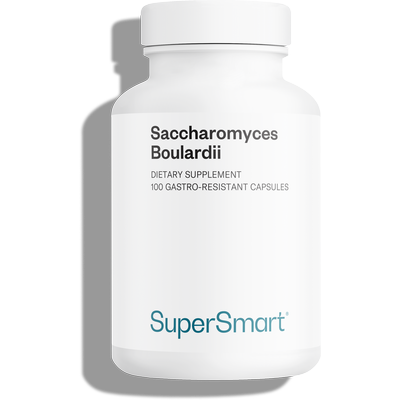
Standardised 2 x 1010 CFU/g. Probiotic used for decades for treating diarrhoea
www.supersmart.com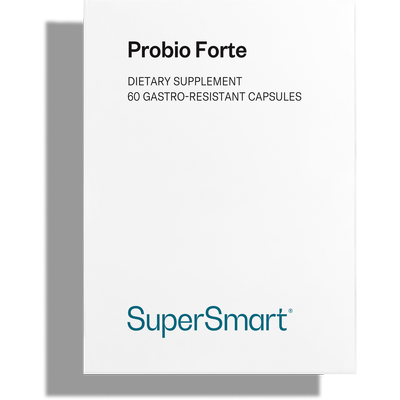
Probiotic mix; 8 billion microorganisms per capsule. In gastro-resistant capsules for optimum efficacy
www.supersmart.com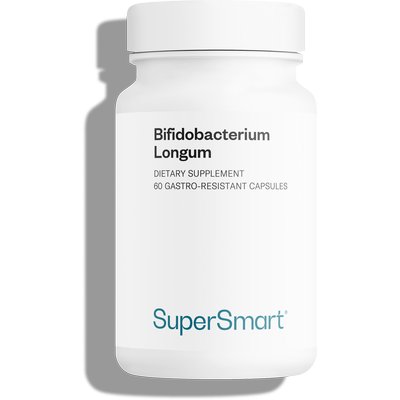
Now in gastro-resistant capsules. New acid-resistant delivery method. One of the most important microbacteria for intestinal health.
www.supersmart.com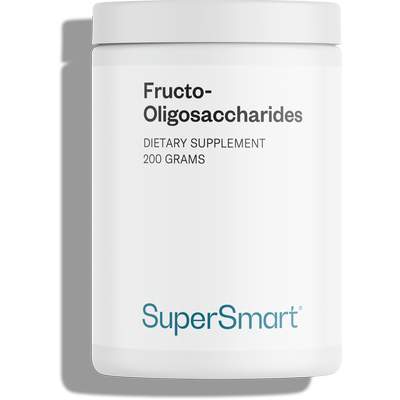
Bifido-active fibre. Improves intestinal health and boosts the body's own natural defences
www.supersmart.com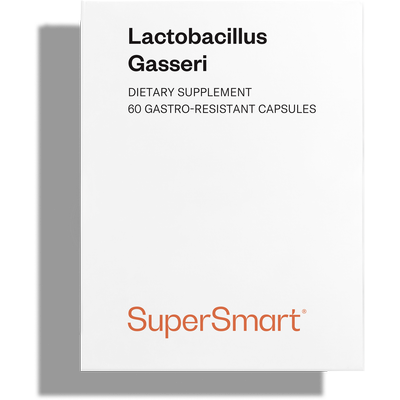
A probiotic strain that’s particularly effective for weight control
www.supersmart.comFurther reading
14-03-2017
Allergies affect between 30% and 40% of the world’s population. They have multiple causes and take various forms such as food allergies, allergic rhinitis, asthma,...
Read more20-02-2017
Recent research could improve our understanding of the origins of Crohn’s disease, a rare and highly complex condition characterised by chronic inflammation of the intestines....
Read more22-02-2017
Louis XIV famously suffered from severe constipation and his doctors would regularly ask him: ”Comment allez-vous (How are you)?”, when what they actually meant was:...
Read more© 1997-2025 Fondation pour le Libre Choix
All rights reserved
All rights reserved
Free
Thank you for visiting our site. Before you go
REGISTER WITHClub SuperSmart
And take advantage
of exclusive benefits:
of exclusive benefits:
- Free: our weekly science-based newsletter "Nutranews"
- Special offers for club members only


















